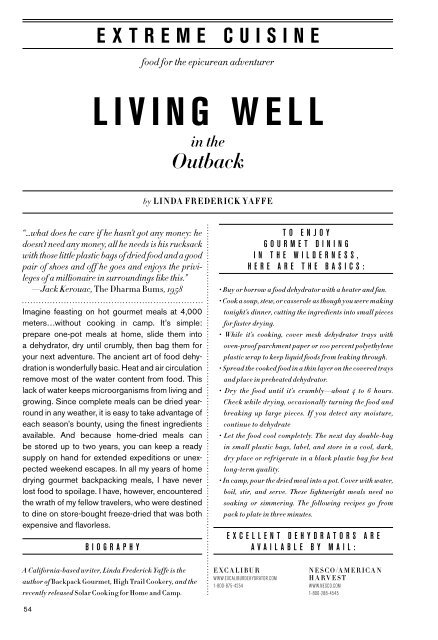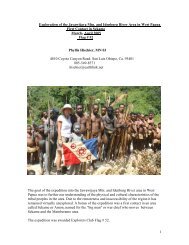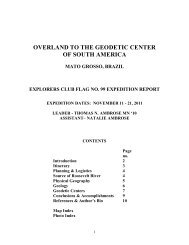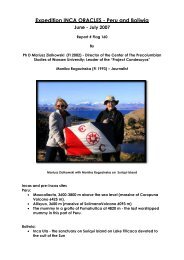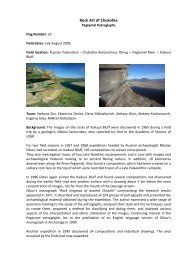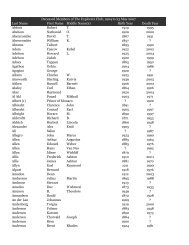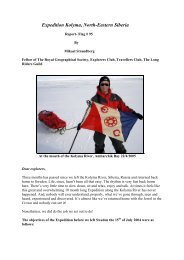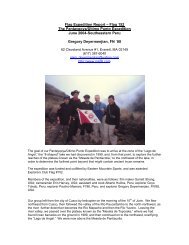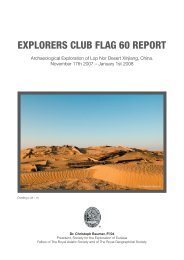the explorers journal the climate change issue - The Explorers Club
the explorers journal the climate change issue - The Explorers Club
the explorers journal the climate change issue - The Explorers Club
You also want an ePaper? Increase the reach of your titles
YUMPU automatically turns print PDFs into web optimized ePapers that Google loves.
E x t r e m e C u i s i n e<br />
“...what does he care if he hasn’t got any money: he<br />
doesn’t need any money, all he needs is his rucksack<br />
with those little plastic bags of dried food and a good<br />
pair of shoes and off he goes and enjoys <strong>the</strong> privileges<br />
of a millionaire in surroundings like this.”<br />
—Jack Kerouac, <strong>The</strong> Dharma Bums, 1958<br />
Imagine feasting on hot gourmet meals at 4,000<br />
meters…without cooking in camp. It’s simple:<br />
prepare one-pot meals at home, slide <strong>the</strong>m into<br />
a dehydrator, dry until crumbly, <strong>the</strong>n bag <strong>the</strong>m for<br />
your next adventure. <strong>The</strong> ancient art of food dehydration<br />
is wonderfully basic. Heat and air circulation<br />
remove most of <strong>the</strong> water content from food. This<br />
lack of water keeps microorganisms from living and<br />
growing. Since complete meals can be dried yearround<br />
in any wea<strong>the</strong>r, it is easy to take advantage of<br />
each season’s bounty, using <strong>the</strong> finest ingredients<br />
available. And because home-dried meals can<br />
be stored up to two years, you can keep a ready<br />
supply on hand for extended expeditions or unexpected<br />
weekend escapes. In all my years of home<br />
drying gourmet backpacking meals, I have never<br />
lost food to spoilage. I have, however, encountered<br />
<strong>the</strong> wrath of my fellow travelers, who were destined<br />
to dine on store-bought freeze-dried that was both<br />
expensive and flavorless.<br />
Biography<br />
A California-based writer, Linda Frederick Yaffe is <strong>the</strong><br />
author of Backpack Gourmet, High Trail Cookery, and <strong>the</strong><br />
recently released Solar Cooking for Home and Camp.<br />
food for <strong>the</strong> epicurean adventurer<br />
L i v i n g W e l l<br />
in <strong>the</strong><br />
Outback<br />
by Linda Frederick Yaffe<br />
To enjoy<br />
gourmet dining<br />
in <strong>the</strong> wilderness,<br />
here are <strong>the</strong> basics:<br />
• Buy or borrow a food dehydrator with a heater and fan.<br />
• Cook a soup, stew, or casserole as though you were making<br />
tonight’s dinner, cutting <strong>the</strong> ingredients into small pieces<br />
for faster drying.<br />
• While it’s cooking, cover mesh dehydrator trays with<br />
oven-proof parchment paper or 100 percent polyethylene<br />
plastic wrap to keep liquid foods from leaking through.<br />
• Spread <strong>the</strong> cooked food in a thin layer on <strong>the</strong> covered trays<br />
and place in preheated dehydrator.<br />
• Dry <strong>the</strong> food until it’s crumbly—about 4 to 6 hours.<br />
Check while drying, occasionally turning <strong>the</strong> food and<br />
breaking up large pieces. If you detect any moisture,<br />
continue to dehydrate<br />
• Let <strong>the</strong> food cool completely. <strong>The</strong> next day double-bag<br />
in small plastic bags, label, and store in a cool, dark,<br />
dry place or refrigerate in a black plastic bag for best<br />
long-term quality.<br />
• In camp, pour <strong>the</strong> dried meal into a pot. Cover with water,<br />
boil, stir, and serve. <strong>The</strong>se lightweight meals need no<br />
soaking or simmering. <strong>The</strong> following recipes go from<br />
pack to plate in three minutes.<br />
E x c e l l e n t d e h y d r a t o r s a r e<br />
available by mail:<br />
Excalibur<br />
www.excaliburdehydrator.com<br />
1-800-875-4254<br />
Nesco/American<br />
Harvest<br />
www.nesco.com<br />
1-800-288-4545<br />
Here are two of my camp favorites<br />
Zinfandel Capellini<br />
serves 4, Weight one dried serving: 6 ounce<br />
1. Heat in a large skillet over medium heat:<br />
• 2 teaspoons extra virgin olive oil<br />
2. Add and cook until transparent:<br />
• 1 onion, minced<br />
3. Reduce heat, add and cook 5 minutes longer:<br />
• 8 ounces diced fresh brown crimini mushrooms<br />
• 4 cloves garlic, minced<br />
4. Meanwhile, cook until barely tender <strong>the</strong>n drain:<br />
• 12 ounces capellini pasta, broken in thirds<br />
5. Stir into <strong>the</strong> mushroom mixture and cook 5 minutes:<br />
• 15 ounces canned small white beans, rinsed and drained<br />
• 1/3 cup T.V.P. (textured vegetable protein)<br />
• 3 cups finely diced tomatoes plus juice<br />
• 1/2 cup chopped fresh basil leaves<br />
• 1/3 cup zinfandel wine<br />
• 1/4 cup salsa<br />
• 1/2 teaspoon salt<br />
• 1/8 teaspoon cayenne pepper<br />
6. Remove skillet from heat and stir in:<br />
• 1/2 cup finely grated Parmesan cheese<br />
7. Toss toge<strong>the</strong>r <strong>the</strong> pasta and sauce, stirring to coat.<br />
8. Spread on covered dehydrator trays and dry for 5<br />
hours at 145 degrees.<br />
9. To rehydrate, cover with water 1/4 - 1/2 inch above<br />
level of food in pot, boil, stir, and serve.<br />
Bouillabaisse<br />
Serves 4, Weight one dried serving: 4 ounces<br />
1. Steep toge<strong>the</strong>r in a measuring cup <strong>the</strong>n set aside:<br />
• 1/4 cup warm water<br />
• 1/2 teaspoon saffron threads<br />
2. Heat in a large skillet over medium heat:<br />
• 3 teaspoons extra virgin olive oil<br />
3. Add and cook for 8 minutes:<br />
• 1 sweet yellow onion, diced<br />
4. Stir in and cook 5 minutes longer:<br />
• 5 cloves garlic, minced<br />
• 4 fresh mushrooms, diced<br />
• 1 teaspoon minced fresh thyme or 1/2 teaspoon dried<br />
• 1/2 teaspoon salt<br />
• 1/4 teaspoon freshly ground black pepper<br />
• 1/8 teaspoon celery seed<br />
3. Place <strong>the</strong> onion and saffron mixtures in a soup pot.<br />
Stir in:<br />
• 3 cups fresh or canned diced tomatoes plus juice<br />
• 2 pounds boneless, skinless fish fillets cut into 1/2 inch cubes<br />
• 1 whole bay leaf<br />
• 2 cups chicken broth<br />
4. Cover, bring to a boil, <strong>the</strong>n reduce heat and simmer<br />
for 30 minutes.<br />
5. Discard bay leaf. Stir in:<br />
• 1/4 cup dry white wine<br />
• 2 tablespoons minced fresh Italian parsley<br />
6. Spread on covered dehydrator trays and dry for 6<br />
hours at 145 degrees.<br />
7. To rehydrate, cover with water 1 inch above level of<br />
food in pot, boil, stir, and serve with crusty bread<br />
or crackers.<br />
Outdoor Cooking<br />
with<br />
Linda Frederick Yaffe<br />
BACKPACK GOURMET<br />
Good Hot Grub You Can Make at Home,<br />
Dehydrate, & Pack for Quick, Easy,<br />
& Healthy Eating on <strong>the</strong> Trail<br />
$12.95, PB, 160 pages, 20 illustrations,<br />
5 1 /2 x 8 1 /4, 978-0-8117-2634-4<br />
Learn to prepare and dehydrate over<br />
160 soups, stews, pastas, casseroles, breakfasts,<br />
and snacks for easy eating on <strong>the</strong> trail.<br />
SOLAR COOKING<br />
FOR HOME AND CAMP<br />
$12.95, PB, 128 pages, 23 illustrations,<br />
5 1 /2 x 8 1 /4, 978-0-8117-3402-8<br />
Full of recipes developed especially<br />
for solar cookers—entrees, side dishes, snacks,<br />
and baked goods—with instructions for making<br />
your own solar box or folding panel cooker.<br />
Available from your favorite bookstore or<br />
STACKPOLE<br />
BOOKS<br />
www.stackpolebooks.com • 1-800-732-3669<br />
54 <strong>the</strong> <strong>explorers</strong> <strong>journal</strong>


